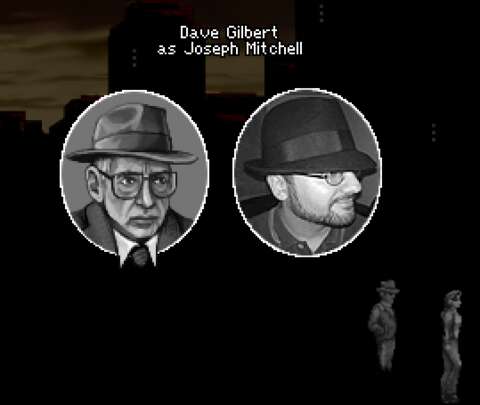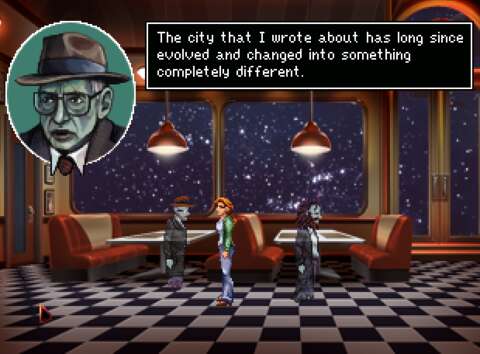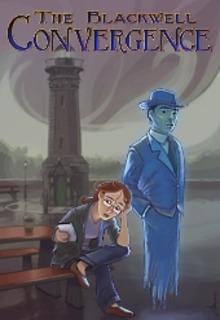INTRO:
The first game in the Blackwell series, Legacy, had a fortunate outcome, despite the inexperience of creator Dave Gilbert at the time. The second game, Unbound, showed his budding skills at gathering talent, learning lessons from previous works and coordinating an indie game project.
The third game, Convergence, is where Dave Gilbert would put the lessons that he has learned to good use, while also making a few new mistakes (albeit minor, fortunately).

PREMISE:
It has been several months since Rosa Blackwell has been introduced to Joey Mallone and since her new life as someone that sends lost souls to rest. This is tiring work, and one that both of them have to keep hidden from others because of fear of Rosa being declared insane.
After another typical send-off done anonymously, they receive rumours of another haunting, and a couple more afterwards. What would appear to be seemingly unrelated cases happen to be linked together by the involvement of someone else with capabilities beyond their mortal ken. Delving further as they must, they discover certain things about their past and their nature as those who rescue lost souls.
This particular entry in the series is also the culmination of Dave Gilbert’s infatuation with a certain famous New Yorker journalist, Joseph Mitchell, and his last subject of research, Joe Gould. It is not exactly the most respectful adaptation of real-world people, but it is an interesting take on the mysteriously decades-long writer’s block that the real Joseph Mitchell had.
NOTEBOOK UPDATE:
Most of the gameplay elements that were seen in Unbound have been retained and even improved upon. The only notable stepback is the notebook.
The clue-matching mechanism has been removed, which reduces the notebook to a mere log of topics for use in conversations.
NOT MUCH THAT JOEY CAN DO:
Joey remains a playable character, but does not exhibit any further overt capabilities, unfortunately. There is a scene of him distracting a cat with his tie, where in the first game he spooked a dog.
The only notable scene of Joey’s capabilities is a reminder of something that has been mentioned in the second game, which is that Joey messes up wireless signals like radio frequencies and wi-fi. He does not seem to be entirely aware of this; rather, the player will need to keep this in mind, in order to get past a certain a hurdle. Even then, the outcome of this scenario can seem underwhelming, because it ultimately relied on the carelessness of people who are not aware of the presence of eavesdropping ghosts.
SEARCHING ON ROSA’S COMPUTER:
Rosa’s computer sees more use this time, specifically as a device that she uses to make searches on the Internet. The player will need to have the duo frequently return to her apartment to do this, however, as well as accessing her email (and those of certain others).
The search program that is used happens to be quite rudimentary, having been coded to compare search words – complete or incomplete – with the database that Gilbert has programmed into the game’s code. Typos will register no results, however, so the player will have to be certain of entering the words correctly; there will be no search aids where typos occur.

VISUAL INDICATORS FOR SWAPPING CHARACTERS:
There is an improvement in the user friendliness of the dual protagonist system, fortunately. Where Unbound lacks visual aid for when characters are being swapped, the mouse cursor changes its hues and opacity when swapping between characters. On the other hand, the cursor remains the same shape, which can be a problem for players with colour blindness or vision issues about saturation and translucency.
SHARPER ART:
By this time, Wadjet Eye has attracted the attention of gifted artists, thanks to Dave Gilbert’s contacts. Players who have been following the series would notice that Convergence benefits from scenes with greater visual details, though many of these are based on places in real-world New York. The sprites do not look terribly out of place thanks to strategic pixilation of the scenery artwork, though the sprites still have noticeably different colour saturation.
STILL NOT A LOT OF ANIMATIONS:
Sprite animations still have low variety. Of course, these are the most time-consuming graphical work; where most of the other graphics seen in the game are actually photos of real locales ran through filters and then rearranged for whatever desired effect, the sprite frames for characters have to be made from scratch. Thus, the observant player might notice that characters have the same posture throughout most of the game, regardless of the situation – Rosa, in particular.
On the other hand, the finale has a lot more animations than the rest of the game, and they were made specifically for this entry of the series. Thus, it is not all lazy-work.
SOUND EFFECTS & AMBIENT NOISES:
The previous two games were notable for not having many sound effects and ambient noises; these very much made their cheap budgets stand out. Convergence actually has these, such as the rain that occurs periodically through the game.
Of course, Convergence is not exactly a super-expensive project; those rain noises are very much stock-standard wind-howls, thunder and pitter-patter of rain, regardless of what surface that the raindrops are landing on. Still, Dave Gilbert has programmed them to precipitate and ease up where dramatically appropriate (or typical).
Some sound effects are cheesy though, especially those associated with ghostly and otherworldly occurrences. For example, there is humming whenever Joey floats through worldly obstacles.
MUSIC:
Thomas Regin returns to provide music for the game. Like Unbound, Convergence has a lot of jazz, though made with more modern instruments. The quality of the tracks in this entry is noticeably different from the previous one; Unbound has more solos, but Convergence has more variety in its tracks. That said, each track is appropriate to the occasion – if the bug that delays music playback does not rear its ugly head.

VOICE-OVERS:
The best – and worst – sound designs remain the voice-overs. Dave Gilbert still has access to skilled voice talents like Rebecca Whittaker and Abe Goldfarb, but he is still using lousy equipment that could not filter out things like breath pops and such.
If one can overlook audio problems like voices not sounding like they are in the same room, there is a lot of entertaining back-and-forth to be heard in this game, especially the banter between Rosa and Joey. Indeed, there are some startling statements that either of them would say, whether the other heard them or not; these are foreshadowing of the stories in the later entries.
SUMMARY:
Convergence is a notably different product from the other games, what with Dave Gilbert having gathered the connections and contacts that provide his games with content of decent quality. It is still very much a low-budget game, but among such games, it is a leader in doing as much as can be done with what is given.

